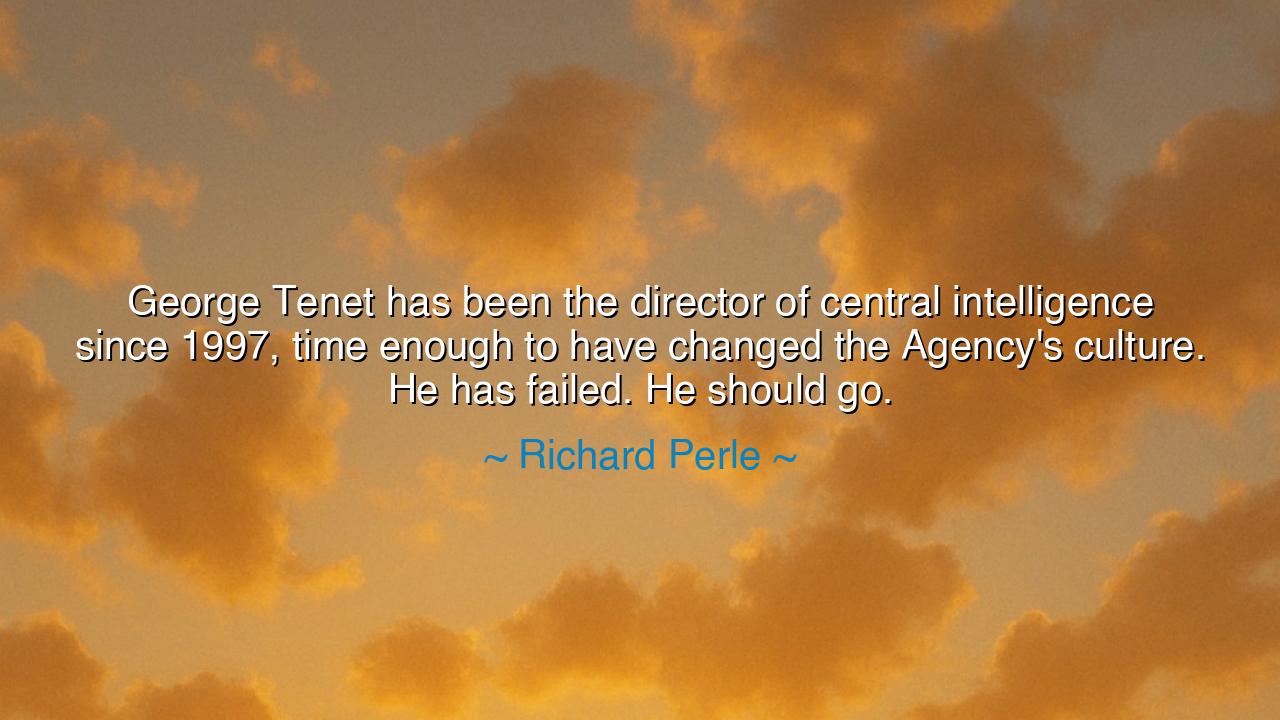
George Tenet has been the director of central intelligence since
George Tenet has been the director of central intelligence since 1997, time enough to have changed the Agency's culture. He has failed. He should go.






When Richard Perle, a man seasoned in the dark arts of policy and power, declared, “George Tenet has been the director of central intelligence since 1997, time enough to have changed the Agency’s culture. He has failed. He should go,” he spoke with the tone not merely of judgment, but of disillusionment. His words, forged in the aftermath of crisis, are born of the ancient tension between leadership and responsibility, between the burden of command and the accountability that must follow when vision falters. Though uttered in the political sphere, this quote carries a wisdom that transcends the walls of government—it speaks to the eternal law of stewardship: that he who bears the mantle of power must also bear the weight of its failures.
In the days following the tragedy of September 11, 2001, America sought answers in the ashes of uncertainty. The Central Intelligence Agency, guardian of unseen knowledge, stood accused of blindness in an age when sight was needed most. George Tenet, who had presided over the CIA since 1997, had promised reform—a new spirit within an old institution, sharper vision in a world of growing shadows. Yet, to Perle and others, the transformation never came. The culture of caution, the layers of secrecy, the divisions between information and decision—these remained. Perle’s words struck like a verdict: time enough to change, but not the courage to do so.
Thus, his statement is not merely an attack upon one man; it is a reflection on the nature of power itself. For power, left unexamined, hardens into habit, and habit becomes the death of vigilance. In the ancient kingdoms, it was said that the ruler who cannot renew his realm invites decay from within. A thousand years before the CIA, emperors and generals learned this same truth: that stagnation is treason to purpose. The leader who clings to the old ways when the world has changed ceases to lead; he merely presides over decline.
Consider the fall of Emperor Diocletian’s successors in Rome. Diocletian himself had sought to reform the Empire’s vast machinery, dividing power, organizing bureaucracy, and restoring discipline. But his heirs, unwilling to challenge the inertia of comfort, let corruption seep back into the halls of governance. Their failure was not one of ignorance but of will—just as Perle accused Tenet of failing not from lack of knowledge, but from lack of transformation. The lesson of history is ever the same: when those entrusted with renewal choose preservation instead of courage, their empires—whether of stone or of secrets—begin to crumble.
And yet, within Perle’s condemnation lies also a warning for all who seek leadership in any age: time alone does not bring change. A decade in power can be wasted as easily as a day. It is not tenure that reforms a culture, but conviction; not position, but passion. Tenet’s long years at the helm, in Perle’s eyes, had given him every chance to reshape the agency into a force fit for new dangers. But leadership without renewal is like a sword kept in its sheath—dull, ceremonial, and useless in battle.
Still, one must not mistake Perle’s words as cold or heartless. They come from a deeper wound—the pain of witnessing a nation’s guardian falter at the hour of need. His declaration, “He should go,” echoes the ancient moral principle that authority must be accountable. Just as a captain who runs his ship aground cannot plead the tide, so too must a leader accept the consequences of failure. In the world of intelligence and war, where the unseen can determine the fate of millions, this principle is sacred. Responsibility is the price of power, and to bear that price honorably is the test of a true servant of the state.
So what wisdom can we, far removed from the corridors of intelligence, draw from these stern words? It is this: to lead is to change. Whether one governs nations or guides a family, directs a company or stewards a dream, one must never grow complacent in the face of duty. The world evolves; so must we. Where there is error, correct it. Where there is weakness, reform it. And where there is failure, accept it and make way for new hands, lest pride become the final betrayal. For as the ancients taught, the leader who cannot renew his people has already lost them.
In this light, Richard Perle’s quote is not merely a political critique—it is a timeless moral charge. It reminds all who carry responsibility that time itself is a gift not to be wasted, and that power without purpose corrodes the soul. Whether in the high councils of empire or in the quiet leadership of daily life, let us remember: to hold authority is to serve renewal, and to fail that service is to fail one’s trust.






AAdministratorAdministrator
Welcome, honored guests. Please leave a comment, we will respond soon